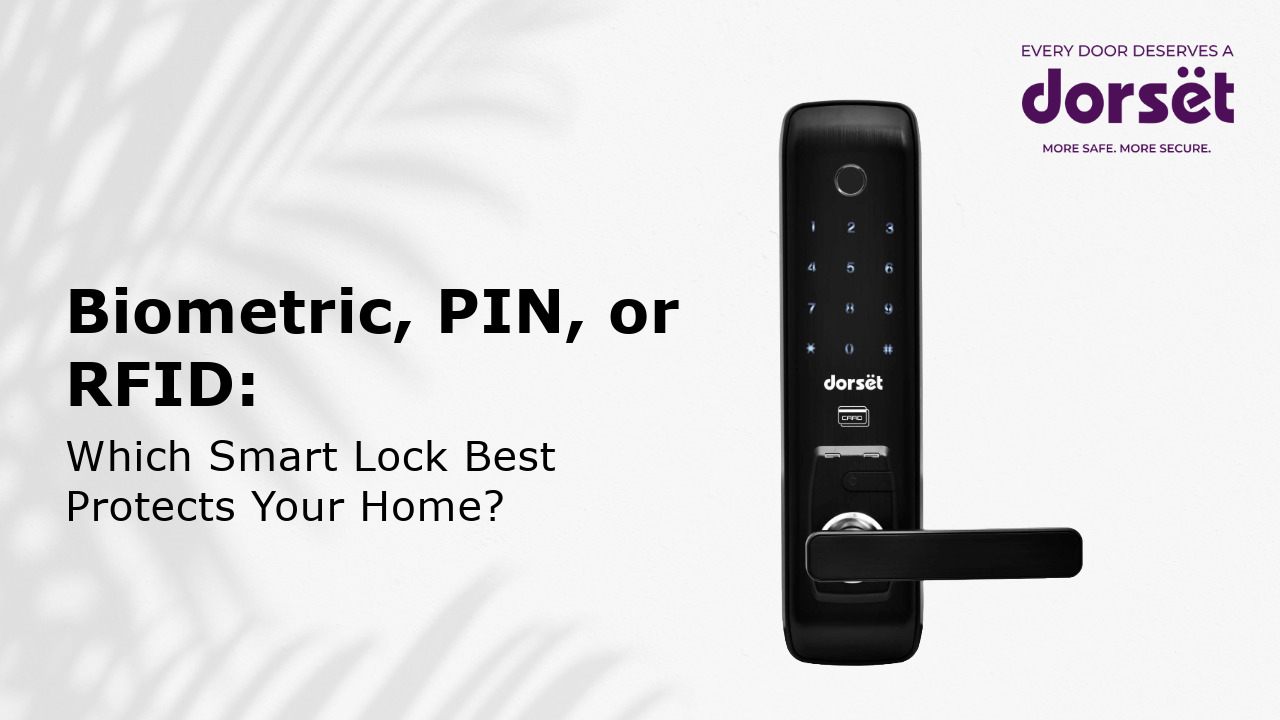Smart locks have changed the way we think about home security. No more fumbling for keys or worrying about losing them. Now, with a touch of a finger or a quick tap of a card, you can step inside your home with ease and peace of mind.
But with so many options available Biometric, PIN code, RFID, or a combination of these it’s easy to get confused. Which smart lock access method is the safest? Which one is the easiest to use? And which one is right for you?
Types of Smart Lock Access
Smart door locks usually offer one or more of these ways to unlock:
- Biometric (Fingerprint)
- PIN Code
- RFID Card
- Mechanical Key (as backup)
Each has its own pros and cons. Many premium models, like the ones from Dorset, offer multiple access options in one device, so you don’t necessarily have to pick just one. But understanding the differences can help you make the best choice for your home.
Biometric Access: Security at Your Fingertips
Biometric locks use your fingerprint to unlock the door. It’s one of the most secure and convenient options available.
Why choose biometric?
- Speed: Unlocks in less than a second.
- Security: Everyone’s fingerprint is unique, making it extremely difficult to duplicate.
- No need to remember anything: You never have to worry about forgetting a password or losing a card.
One great example is the Dorset DG 202 Mortise Digital Door Lock, which supports fingerprint access along with PIN and RFID. It’s ideal for family homes, especially if you want to grant easy access to kids or elderly family members without the hassle of physical keys.
Things to consider:
- The sensor may be less responsive if your fingers are wet or dirty.
- You’ll need to ensure the lock has a quality fingerprint scanner. (Dorset’s locks use high-grade sensors for faster recognition.)
If maximum security is your top priority, a biometric smart lock for door is a solid bet.
PIN Code Access: Simple and Reliable
If you prefer a method that doesn’t rely on physical access, PIN code access is an excellent choice.
Why choose a PIN code?
- No physical token required: You just need to remember the number.
- You can share it remotely: Great for Airbnb hosts or giving temporary access to guests or service personnel.
- Multiple users: Some locks allow you to assign different codes for different users.
The Dorset DG 203 Mortise Digital Door Lock offers up to 100 unique PIN entries perfect if you want to assign different codes to family members, helpers, or guests. Plus, the keypad lock comes with mechanical key access as a backup, just in case.
Things to consider:
- PINs can be forgotten or guessed if they’re too simple.
- You’ll want to clean the keypad regularly to avoid leaving fingerprints on the commonly used numbers.
Some Dorset locks even include random number input features, where you enter a few random digits before or after your PIN to prevent others from figuring it out by watching you.
RFID Access: Tap and Go
RFID (Radio Frequency Identification) is the method used in many hotel rooms: you tap a small card or tag against the lock, and it opens.
Why choose RFID?
- Quick access: Just tap the card no codes or biometrics needed.
- Ideal for kids or guests: Easy to hand out cards and deactivate them if needed.
- Minimal wear and tear: Cards last a long time and don’t suffer from regular mechanical use.
The Dorset DG 502 Mortise Digital Door Lock offers RFID access in addition to fingerprint, PIN, and mobile app control. It’s great for homes with frequent visitors, tenants, or large families who need multiple access modes.
Things to consider:
- Cards can be lost or stolen (though they can be quickly deactivated).
- Some might prefer a non-physical access method for better convenience.
For homes where multiple people come and go regularly, RFID digital lock offers a great balance of security and ease.
Why Not Have It All?
In most modern homes, flexibility is key. You may want to use your fingerprint, while your kids prefer a PIN, and your housekeeper uses an RFID card.
That’s why many premium smart locks including those in Dorset’s Mortise Digital Lock series offer all three access types, along with mechanical key backup. For example, the Dorset DG 206 Mortise Digital Door Lock doesn’t just stop at fingerprint, PIN, and RFID. It also includes app-based remote access and video surveillance features, giving you complete control over who enters your home and when.
These all-in-one locks give you the freedom to choose what’s most convenient for you and change access methods as your needs evolve.
Final Thoughts
When it comes to choosing between Biometric, PIN, or RFID, there’s no one-size-fits-all answer. Each method has its strengths, and the best choice depends on your lifestyle, household needs, and how much convenience or security you want.
The good news? You don’t have to pick just one. With smart locks like the Dorset DG 203, DG 502, and DG 206, you can combine multiple access types and enjoy the best of all worlds in an electronic door lock without compromising on safety or style.
In the end, a secure home isn’t just about keeping others out, it’s about making sure you, and the people you trust, can always get in with ease.



